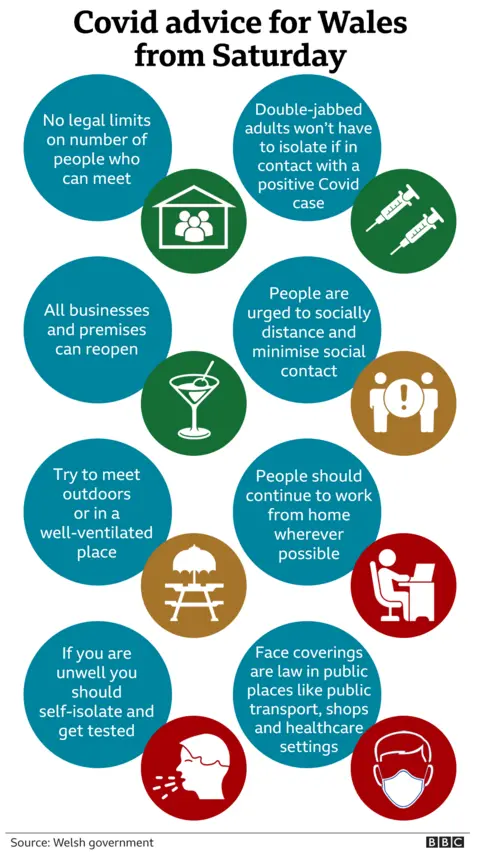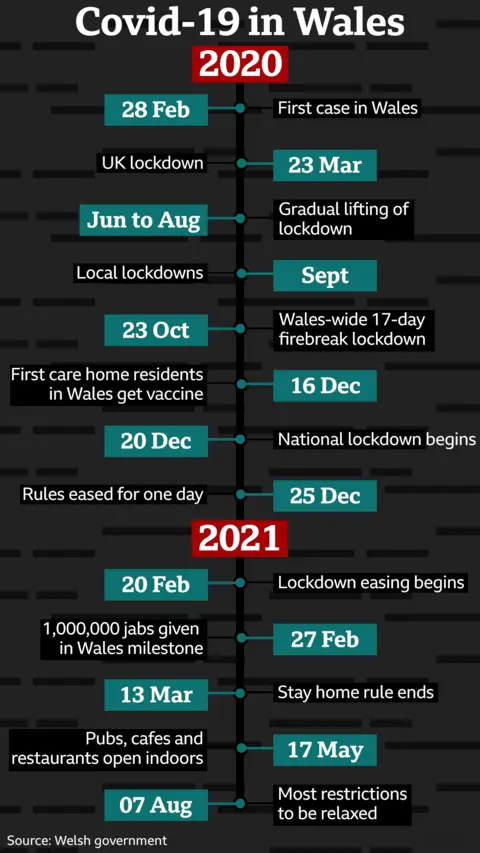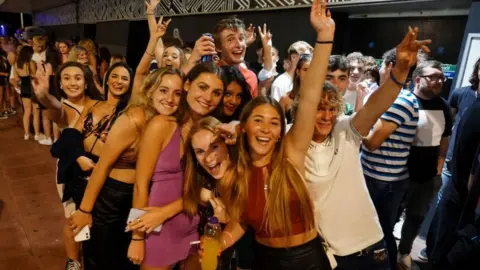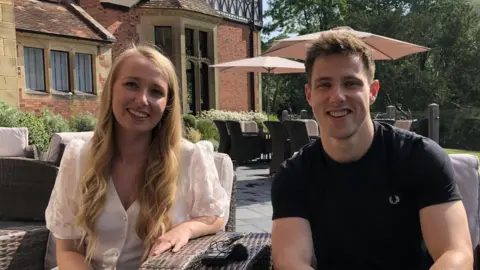Covid: Most of Wales' coronavirus rules to end Saturday
Most of Wales' remaining Covid rules will be lifted as the nation enters the "final lap" of the pandemic, the first minister has said.
Social distancing laws and rules on who can meet indoors will end on Saturday, almost 17 months after the first lockdown.
However, rules will remain tighter than in England, with face masks still required by law in many public places.
Mark Drakeford said they will likely be needed for the rest of the year.
He warned the changes did not mean a "free-for-all".
Wales will move to alert level zero - the lowest level of restrictions seen so far - from 06:00 BST on Saturday.
Mr Drakeford said as the case rate had steadily declined for the past three weeks and vaccinations had increased, most rules could now be scrapped.
He told a press briefing that the easing of restrictions was a "significant moment for all of us" and a "big step closer to life before the pandemic started".
In response to the news, Plaid Cymru and the Welsh Conservatives said it was time for a Wales-specific inquiry into the way the pandemic had been handled in Wales.


The first minister urged people to be sensible, to continue to practise social distancing, think about who they meet and where, and not behave as if the "virus has disappeared".
"Most people in Wales want to go on acting carefully to protect their health and the health of others," he said.
Mr Drakeford said with such major changes to rules, the impact on case rates needed to be seen and so no further relaxation was expected to be made for "at least six weeks".
Mr Drakeford said while he did not expect Wales to have to return to tight restrictions such as lockdown measures, he could not rule anything out if there was a "sudden change for the worse".
However, he said: "Provided we do not see further unexpected turns in the course of the virus, then I think we can have confidence that we are on the final lap of emerging from the pandemic."
Under the changes from Saturday:
- There will be no limit on the numbers that can meet indoors, including in homes, public places and at events
- Any businesses still closed, such as nightclubs, can reopen
- Laws requiring companies and organisations to socially distance indoors will end
- Pubs will no longer have to provide table service
However companies will still be expected to take measures to reduce the risk of coronavirus being transmitted on their premises.
It will be the law to wear face masks in indoor public places including shops, buses and trains, and in health and social care settings, but not in venues where food and drink is served, such as pubs.
Mr Drakeford told BBC Wales face coverings were "likely" to play a part in helping tackle coronavirus "for the rest of this year".
While the changes will see most of Wales' rules lifted, more restrictions remain in place than across the border in England, where they were scrapped on so-called "freedom day" on 18 July.
Most restrictions in Scotland will come to an end on Monday - and with face masks still required in shops, the rules will be similar to here in Wales.
Meanwhile, in Northern Ireland rules on who you can meet and where remain in place.


Laws on who you can meet indoors have existed since the start of the lockdown in March 2020.
Current restrictions - to be scrapped on Saturday - say only six people are able to meet in private homes.
People will continue to have to self-isolate by law for 10 days if they get Covid, while the Welsh government advice will be to continue to work from home where possible.
However, those who are fully vaccinated and are found to be a close contact of a positive Covid case will not need to self-isolate from Saturday.
The decision to lift the social distancing duty on businesses means firms will instead be expected to put in place measures to keep people safe and draw up risk assessments.
That could see them continuing to require social distancing, face masks, or use other measures such as ventilation or a combination of these, with the first minister saying he did not expect "large crowds of people" would be seen at bars as businesses tried to keep punters safe.
 Getty Images
Getty ImagesSome pub and bar owners have said while they were pleased to be able to "throw away the measuring tape", the onus on businesses to set their own rules was unfair.
Joanne Cooney, owner of Cooney's Bar in Llandudno, said with rules being different in England, some places had reported issues with tourists refusing to wear masks and stay apart, and having different rules in different businesses could make it worse.
"We are having to try and figure out very confusing guidance... people think everything's gone back to normal, but it's not, they've just said 'it's all on you now'", she told BBC Radio Wales.
Ms Cooney said the guidance setting out what businesses should do from Saturday was "unclear", and called for clarity from the Welsh government.
Responding to the concerns, Mr Drakeford said the guidance was clear, and the measures were to make sure staff and customers were "properly protected" and give people confidence they could go out.
'We can just look forward to it'

Wedding receptions have been subject to restrictions since March 2020 - but from Saturday those will be lifted.
Jordan and Emily Burns, from Buckley in Flintshire, should have been married in April 2020 - two weeks after lockdown began.
They have rearranged their ceremony four times since and had a small, legal marriage ceremony four months ago.
On Saturday, however, they will have the big wedding they always wanted at Ty'n Dwr Hall in Llangollen.
Mrs Burns said: "It's been only six to a table in weddings - our tables will have 24 people, which just seems crazy doesn't it?
"We're able to have the ceremony indoors so we're not worried with the weather. It just takes so much pressure off us as well and we can just look forward to it, be excited and just enjoy the day."

'Take it slowly'
Stacey Alford, a DJ from Penarth, Vale of Glamorgan, said the pandemic "pulled the plug" on her career.
She said the music community was excited to see Wales moving to alert level zero, but was aware of the need for caution.
"The general consensus is 'get us in there, we can't wait' - but obviously we want everyone to just take it slowly, enjoy themselves but not be silly."
The changes mean there will be fewer Covid rules to police.
But Mark Jones, general secretary of the North Wales Police Federation, fears a return to normality for the public will put pressure on officers.
"We're seeing the first time in near enough two summers where freedom is there, so a lot of people will be coming to visit north Wales and we're anticipating demands on policing, which means that the thin blue line is going to be stretched even further and further," he said.

Exactly 500 days after telling us to stay home, Mark Drakeford has confirmed an end to the rules on who and where we meet.
He has deliberately avoided repeating Boris Johnson's assurance that we are on an "irreversible" path out.
But the success of the vaccination programme means the bar for "re-imposing severe restrictions will be higher", the Welsh government says.
The next step is to provide booster jabs. Some people will get one with their annual flu jab in the autumn.
In a clear signal about the ongoing threat of the pandemic, ministers say they are worried about a "perfect storm" of Covid and flu this winter.

Calls for Wales inquiry
Following the announcement, opposition parties called for people to act responsibly, and pressed again for a Wales-only inquiry into the handling of Covid by the Welsh government.
More than 7,900 have died since the pandemic began.
Plaid Cymru said it wanted "reassurance from government that lessons have been learnt", and the Tories said those who have suffered should be given justice.
Welsh Conservative Senedd leader, Andrew RT Davies, said that as Wales moved forward people had to "take responsibility" to stop cases rising.
"We are going to have to learn to live with Covid, because we can't afford to go back into the lockdowns that have blighted our lives in the past 15, 16 months," he said.
Plaid Cymru's health spokesman, Rhun ap Iorwerth, welcomed the move forward, but said the ministers must be ready to take a step back if necessary.
"Now what we want as these freedoms come back is to see in clear evidence terms that government is honing its early-warning systems even more, is even more vigilant about any curveballs sent in our direction," he said.
However, Mr Drakeford, who has already agreed to a UK-wide inquiry, said a Wales specific inquiry would not give a "proper understanding" of how the pandemic was handled.
Wales has seen a third wave of coronavirus cases in recent months - but it peaked on 16 July and has been decreasing ever since.
Latest figures published on Friday showed Wales' case rate had fallen slightly, to 132.4 per 100,000 people over a seven-day period.
They also showed 66% of Wales' total population was fully vaccinated, with health boards now inviting 16 and 17-year-olds for their jabs.
Mr Drakeford said health boards were ready to start offering booster jabs from September, but the government were waiting for advice from the Joint Committee on Vaccination and Immunisation.

- INSTATRADERS: Is foreign exchange trading a trustworthy route to extra cash?
- THE EVERYDAY HUSTLE: What are the first steps to becoming financially independent?

